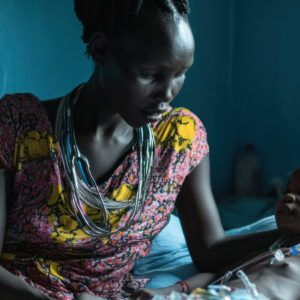The “ministry of presence” represents a deeply meaningful expression of compassionate care that authentically mirrors God’s unconditional love for all humanity throughout creation and redemptive history. Firmly rooted in 2 Corinthians 1:3-4, this ministry powerfully emphasizes being physically and emotionally present with those who suffer.
This profound ministry emphasizes the spiritual significance of simply being with those who suffer in their darkest moments, offering genuine comfort, upholding human dignity, and facilitating holistic healing even when medical resources are severely limited or entirely absent in challenging environments.
Across diverse rural healthcare settings spanning South Africa’s remote villages, the Indian subcontinent’s underserved regions, Southeast Asia’s isolated communities, and Latin America’s resource-constrained areas, dedicated Christian healthcare providers faithfully embody this sacred mission (Missio Dei) through their committed practice of simply being present.
This exploration examines how intentional listening with one’s whole heart, compassionate physical touch that communicates dignity, intercessory prayer that connects patients to God’s comfort, and unwavering companionship through suffering collectively create sacred healing spaces where God’s redemptive mission naturally flows, bringing transformative holistic healing to countless individuals and communities as a poignant conduit for a gospel-centered witness.
The Ministry of Presence: A Biblical Foundation
At the profound spiritual heart of the ministry of presence lies the biblical call to genuinely comfort those experiencing distress, isolation, and suffering in their lives. In 2 Corinthians 1:3-4, Paul eloquently describes God as “the Father of compassion and the God of all comfort, who comforts us in all our troubles.”
This powerful scripture continues by explaining God’s purpose in our comfort: “so that we can comfort those in any trouble with the comfort we ourselves receive from God.” Healthcare providers who faithfully practice compassionate presence thereby become vessels of this divine comfort, authentically reflecting God’s unconditional love through their daily actions.
Jesus as the Ultimate Model of Presence
Jesus Christ perfectly embodied the ministry of presence throughout His transformative earthly ministry among people of all backgrounds and circumstances. He courageously touched those deemed untouchable by society, compassionately dined with marginalized sinners, and faithfully stood beside those suffering when others turned away in fear or judgment.
His mere presence alone demonstrated remarkable healing power, as beautifully illustrated in the moving story of the desperate woman who simply touched His cloak (Mark 5:25-34). Likewise, in resource-constrained rural healthcare settings where advanced medical resources remain severely limited, the seemingly simple yet profound act of being fully present can become a powerful conduit of God’s transformative healing power.
The Image of God and Human Dignity
Genesis 1:27 definitively declares that every single person is wonderfully made in the sacred image of God, regardless of their status, health condition, or social standing. This foundational biblical truth firmly affirms the inherent dignity of each patient, powerfully reinforcing the critical importance of providing truly compassionate care.
When dedicated healthcare providers intentionally treat their patients not merely as clinical cases but as unique individuals inherently worthy of genuine love and focused attention, they faithfully uphold this divine image imprinted on every human soul and actively participate in God’s redemptive mission throughout the world today.
Presence in Rural Healthcare: Stories from the Field
South Africa: Walking with Patients in Remote Clinics
Throughout South Africa’s extensive rural areas, vital mobile clinics serve as essential lifelines to isolated communities with extremely limited access to proper hospitals or consistent medical care. Dedicated Christian healthcare workers serving in these remote clinics do far more than simply provide basic medical treatment—they intentionally sit with suffering patients, listen attentively to their personal stories, and pray earnestly with them for healing and comfort.
One experienced nurse working in these challenging conditions thoughtfully shared this profound insight from her years of service: “Sometimes, the greatest and most meaningful healing comes not primarily from the medicine we carefully administer, but from the unconditional love we consistently show through our presence with those who feel forgotten by the world.”
The Indian Subcontinent: Breaking Isolation Through Presence
Leprosy and numerous other heavily stigmatized diseases continue to cruelly isolate countless vulnerable individuals throughout India and its surrounding regions, cutting them off from human connection and dignity. Compassionate Christian caregivers working faithfully in these challenging social contexts bring substantially more than just medical aid—they bring renewed human dignity to those society has rejected as untouchable or unworthy.
By courageously touching and genuinely embracing those whom mainstream society cruelly rejects and avoids, these dedicated healthcare workers faithfully follow Christ’s powerful example demonstrated in Luke 5:31 where Jesus clearly states: “It is not the healthy who need a doctor, but the sick who require compassionate care and healing presence.”
Southeast Asia: Creating Sacred Spaces for Healing
In numerous remote Southeast Asian villages situated far from modern healthcare facilities, traditional medicine practices frequently coexist alongside extremely limited modern healthcare options for local residents. Christian doctors and nurses working in these isolated areas intentionally integrate their deeply-held faith into their daily medical practice by consistently praying with concerned patients, offering much-needed psychological counseling, and reassuringly reminding them of God’s unfailing love.
In many documented cases throughout the region, these seemingly simple yet profoundly meaningful acts of genuine presence significantly reduce patient fear and debilitating anxiety, effectively fostering holistic healing that extends far beyond addressing merely physical ailments to touch emotional and spiritual needs as well.
Latin America: Companionship in the Midst of Hardship
Many compassionate Latin American healthcare initiatives specifically focus on providing truly holistic healing approaches—comprehensively addressing interconnected physical, emotional, and spiritual needs rather than treating isolated symptoms. Dedicated Christian volunteers who faithfully accompany terminally ill patients through their difficult journey consistently emphasize the importance of genuine presence over technical medical procedures alone.
One experienced doctor working in this challenging context thoughtfully reflected on years of service: “We may not always have adequate resources to completely cure every condition we encounter, but we absolutely always possess the innate human capacity to provide deeply compassionate care through our unwavering presence with those who suffer.”
How Presence Creates Sacred Spaces for Healing
The Power of Listening
Active, empathetic listening represents an essential cornerstone of truly compassionate healthcare that honors patient dignity and experiences. James 1:19 urgently instructs all believers to “be quick to listen, slow to speak,” clearly highlighting the spiritual importance of genuinely giving patients a respected voice in their own healthcare journey.
In numerous rural healthcare settings worldwide, where vulnerable patients may frequently feel systematically ignored or fundamentally misunderstood by medical systems, being truly heard and validated by a compassionate healthcare provider can prove deeply healing for both body and spirit in ways medicine alone cannot accomplish.
The Healing Touch
Jesus frequently healed suffering individuals through compassionate physical touch, powerfully demonstrating the profound healing potential of genuine human connection across social barriers. In Matthew 8:3, we witness Christ touching a leper when no one else would, immediately restoring both health and dignity through this brave act of connection.
In challenging contexts where sophisticated medical technology remains unavailable or severely limited, a reassuring hand gently placed on a patient’s shoulder or quietly holding their hand during difficult procedures can effectively communicate genuine love and unwavering solidarity, significantly easing suffering in remarkably profound ways beyond what medicine alone might achieve.
Prayer and Spiritual Support
Intercessory prayer constitutes a vital and irreplaceable component of the comprehensive ministry of presence practiced by Christian healthcare workers serving in diverse global contexts. Even in situations where immediate physical healing regrettably does not occur, sincere prayer powerfully reassures anxious patients that they are never truly alone in their suffering.
Many experienced Christian healthcare workers consistently report that their vulnerable patients discover unexpected peace and remarkable inner strength through shared prayer experiences, even while facing extremely dire medical circumstances that might otherwise lead to despair without this spiritual dimension of holistic care and divine comfort.
Companionship in Suffering
In particularly difficult moments of severe illness or impending death, compassionate presence itself becomes an invaluable gift beyond measure for patients and their concerned families. Romans 12:15 clearly instructs all believers to “mourn with those who mourn,” creating a biblical mandate for accompanying others through suffering.
Healthcare providers who faithfully remain with dying patients during their final moments on earth powerfully testify to the enduring reality of God’s unconditional love, offering a meaningful foretaste of His eternal presence that awaits beyond suffering, while providing essential comfort that transcends medical intervention when cure is no longer possible.
Practical Ways to Practice the Ministry of Presence
1. Be Fully Present
Consciously avoid all potential distractions and focus your complete attention entirely on the unique person sitting directly in front of you during each patient encounter. Maintaining genuine eye contact, practicing deeply attentive listening without interruption, and adopting open body language collectively communicate authentic presence that truly values the individual seeking care.
2. Cultivate a Heart of Compassion
Regularly ask God through consistent prayer for the supernatural ability to see each patient through His infinitely compassionate eyes rather than through clinical detachment. True compassion gradually grows through dedicated prayer practices, thoughtful theological reflection, and intentional engagement with those experiencing various forms of suffering throughout your community.
3. Integrate Prayer into Care
Thoughtfully offer to pray with concerned patients when culturally appropriate and welcomed in diverse healthcare contexts. Even when working in strictly secular healthcare settings where explicit prayer might not be permitted, silent prayers offered during patient care can effectively invite God’s healing presence into every healthcare interaction.
4. Partner with Communities
Intentionally work alongside local churches, respected community leaders, and established indigenous organizations to ensure culturally sensitive and truly holistic care that respects local practices. The effectiveness of compassionate presence becomes significantly strengthened when it is genuinely community-centered rather than imposed from outside cultural frameworks without adequate contextual understanding.
5. Practice Self-Care
Compassion fatigue represents a very real occupational hazard for healthcare providers regularly witnessing intense suffering. To maintain the capacity to be fully present for others consistently over time, dedicated healthcare providers must intentionally nurture their own spiritual, emotional, and physical well-being through regular self-care practices and supportive community.
Conclusion: Joining God’s Mission Through Presence
The ministry of presence represents a sacred calling that extends far beyond merely providing technical medical treatment to addressing deeper human needs. It constitutes a direct and meaningful participation in God’s redemptive mission throughout creation, bringing His divine comfort, unconditional love, and holistic healing into broken spaces where suffering exists.
Whether serving faithfully in remote rural clinics, culturally isolated communities, or economically impoverished villages across diverse global contexts, Christian healthcare providers who consistently embody this ministry serve as Christ’s compassionate hands in a wounded world desperately needing authentic care and genuine connection.
By walking alongside those who suffer with humility and compassion, these dedicated healthcare professionals powerfully reflect the loving heart of God through their daily work and create sacred spaces for holistic healing, continually reminding us all that in His divine presence, there always remains hope beyond suffering.
Sources:
- The Holy Bible (NIV)
- Missional University Resources on Compassion Care
- “The Wounded Healer” by Henri Nouwen
- “When Helping Hurts: How to Alleviate Poverty Without Hurting the Poor… and Yourself” by Steve Corbett and Brian Fikkert
- Reports from Christian Medical Missions organizations

Liezl Erlank is a dynamic professional with extensive experience and a strong educational background, particularly in the realm of missional work. Her career began with a foundation in communication and theology, earning degrees in Communication Science, Film and Visual Studies, and Practical Theology. Liezl’s missional journey is highlighted by her roles in youth ministry, leadership at a Christian radio network and a Christian magazine in South Africa, where she managed operations, team leadership, online marketing, and content development. Her dedication to youth ministry, education, and Christian media underscores her passion for serving communities and spreading the Christian message. Fluent in English and Afrikaans, Liezl’s proactive mindset, leadership skills, and commitment to continuous learning have enabled her to make a significant impact in her various roles, reflecting her dedication to excellence and meaningful contribution to mission work.




